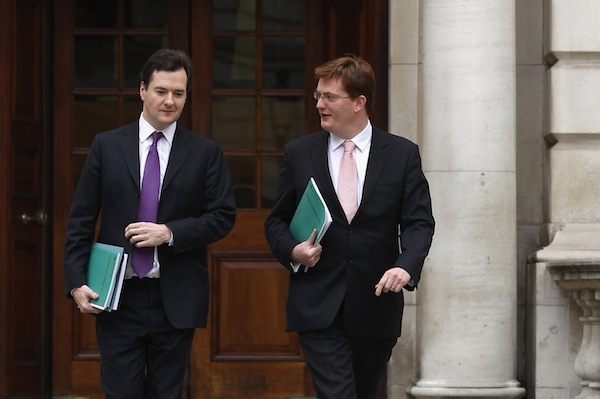The Office of Budget Responsibility was created to be George Osborne’s friend. The theory was that under the leadership of Sir Alan Budd, the OBR would urge the Chancellor to cut. Budd would be listened to more than Robert Chote, who was then running the IFS. But when Sir Alan quit unexpectedly, Chote took over. Since then, the OBR has become the in-house prophet of doom. It not only points to a growth-free future for Britain, but keeps getting its forecasts wrong. It is proving laughably unreliable as a means for working out the likely effect of UK government policy.
In the Telegraph today, Doug McWilliams who wrote the original brief for the OBR, has attacked the current chairman for causing the Chancellor ‘no end of trouble’ and branded the organisation a ‘disaster’. In particular, McWilliams said the organisation has ‘completely failed to understand how to bring in information from the outside’.
It’s easy to see where McWilliams is coming from. Examining the OBR’s forecasts over the past two years shows just how they lulled Osborne into a false sense of security two years ago, suggesting that his policies for prosperity would be enough. Take GDP — the OBR estimates have differed significantly from their first report (before the June 2010 budget) and their latest publication in March:
Their forecasts for unemployment have also differed slightly over the past three years:
Osborne’s biggest headache now is the soaring cost of living, with prices running way ahead of wages. The Chancellor even put up VAT, not knowing he’d just be piling on the pain for consumers who were to face the worst inflation in the EU. The chart below show OBR predictions for inflation (measured with CPI) have been reforecast in the opposition direction they initially predicted:
McWilliams went onto the Today programme, where he went further, arguing that the OBR’s predictions for growth have led the government down a blind path:
‘In effect, I think, the coalition has lost the first couple of years, looking at economic growth, because they thought economic growth would come back anyway, and it’s turned out not to have happened.’
Of course, predicting what the economy is going to do is never easy, with the OBR saying in a statement that ‘the huge uncertainty around all forecasts’ is the a major factor. That’s as maybe, but the OBR seems to be getting it even more wrong than the Bank of England.
But the OBR’s adjustments to their figures have fallen in line with a Westminster-based consensus using tried and tested economic models. As their lack of accurate forecasting has proven, conventional tools have failed to understand the currents we are experiencing. Quantitative Easing is an example of a wild card that no one really knows how to analyse.
That knowledge that OBR forecasts are not worth taking too seriously is now understood throughout Westminster. It seems that Britain’s economic problems have now outgrown the capacity for the economists’ tools to measure them. The Treasury has no end of five-year forecasts but the future for Osborne, is horribly unpredictable.






Comments